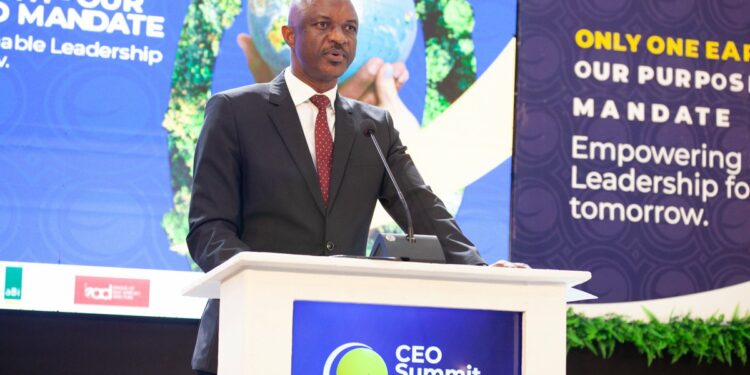During the 15th CEO Summit held on Friday at Mestil Hotel, the Permanent Secretary of the Ministry of Finance, Planning, and Economic Development, Mr. Ramathan Ggoobi, delivered a compelling address emphasizing the urgent need for sustainability in the face of climate change.
The summit, themed “Only One Earth: Our Purpose and Mandate,” was a platform for discussing the profound impact of environmental degradation and the importance of global and national sustainability frameworks.
Mr. Ggoobi began his address with a stark reminder of the singularity of Earth. “We have only one Earth. We can’t say if we mess up with this one, we shall go somewhere else. Even in marriages, as people say, you know, we shall be here until we die. When they mess up, sometimes they divorce and move to another one. The Earth is only one. So I thank you. I congratulate you for reminding us of this,” he stated.
He highlighted the extensive challenges posed by climate change, noting its severe economic ramifications. “Climate change remains a significant development concern with very dire economy-wide effects,” Mr. Ggoobi said. He outlined the impacts such as biodiversity loss, resource depletion, and reduced agricultural productivity, which are particularly alarming for a predominantly agrarian country like Uganda. The effects also extend to human mortality, adding to the urgency of addressing climate issues.
Mr. Ggoobi referenced data from the International Monetary Fund (IMF), indicating that global investment requirements for climate action could range between $3 trillion and $6 trillion by 2050. In comparison, Uganda’s economy is valued at approximately $53 billion, underscoring the vast scale of the financial commitment needed. Nationally, Uganda’s climate finance needs are projected to be $28.1 billion through 2029-30.
According to Ggoobi in response to these challenges, the Ugandan government is taking significant steps to integrate sustainability into its development frameworks. The Ministry of Finance has established a climate finance unit tasked with coordinating the mobilization, access, expenditure, and tracking of climate and green finance.
Additionally, climate change considerations have been embedded in all fiscal frameworks. The Ministry has also developed a national climate finance strategy covering 2020-2024, aimed at enhancing the mobilization, utilization, and tracking of climate finance to support inclusive sustainable development.
The enactment of the National Climate Change Act is another critical measure. This law mandates climate-responsive budgeting and ensures that public investments adhere to sustainability standards. Before any policy paper, act, or expenditure is approved, a dedicated team reviews compliance with these sustainability requirements.
Mr. Ggoobi urged leaders to adopt bold and visionary approaches to sustainability, emphasizing that it should be viewed not as a cost but as an investment in future prosperity. “Please as leaders, we need to prioritize sustainability in decision-making. Let us be bold and visionary and ensure that these things we don’t just speak about them, but mainstream them in our initiatives and decision-making practices,” he asserted.
He called for collaboration among the government, private sector, civil society, and international development partners to address sustainability challenges. Reflecting on the value of life and the importance of future preservation, Mr. Ggoobi stated,
“Someone once said, When you realize the value of all life, you dwell less on what is past and concentrate more on preserving the future. You know, life is about the future. It’s not about the past. That’s why, instead of just concentrating on mitigation, we are saying we must adapt. And we adapting our prosperity and development initiatives to climate change and sustainability.”
Steven Mukasa the Country Lead CEO Summit alluded to the theme of the conference One Earth, our Purpose and our Mandate; which calls for the purpose and mandate of captains of industry, the purpose and mandate of entrepreneurs, and all decision-makers. “The theme of the conference is only one Earth. We are acknowledging that there’s only one Earth. There is no second Earth. There cannot be any third Earth. If we don’t take good care of this earth, there is nowhere we are going to go. So we kicked off by reminding the captains of industry that the earth is crying.
Mukasa added that the earth is in pain and high temperatures are seen which is affecting the way the operations are going on. “But who is to blame? All of us are to blame. So we are coming together and asking ourselves, in our respective capacities as decision-makers, what can we do to ensure that our operations don’t hamper this earth?” he asked.
He noted that the CEO Summit was reminding captains of industry that it’s man’s cause, his noble intention to make sure that everything that is being done is done to protect the environment, to protect the earth.
“If we don’t take good care of this earth by just looking at the rising water levels, looking at the heat, and the destroyed weather patterns, we have something to do. Can we look at our scope? One, emissions, can we look at our scope? Two emissions, can we look at our scope? Three emissions, what are we doing about neutralizing these emissions? Are we intentional to make sure that by a certain year? Now we’ve heard from QCL Quality Chemicals Industries Limited they’re saying by 2030 they should have neutralized the emissions. We also going the extra mile to say, what can we do in terms of recycling the waste? How do you treat How do you treat the waste? Are we doing something about it?
The summit comes at a critical time for Uganda, which is grappling with severe climate-related challenges, including landslides in the East, the bursting of River Nyamwamba, and a landfill slide that has left the city struggling with solid waste management.
Do you have a story in your community or an opinion to share with us: Email us at editorial@watchdoguganda.com













